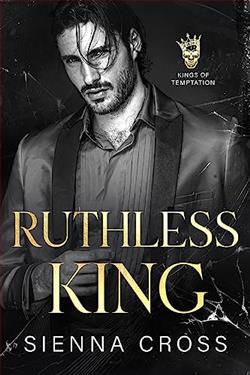Page 48 of Your Every Wish
“Let me put on some clothes. Make yourself at home.” He starts for the stairs and calls over his shoulder. “Don’t steal anything. ”
The dogs follow him up to the second story, leaving me alone to gawk at his beautiful house. And gawk I do, starting with giving myself a tour. The house is massive. The two-story foyer alone could house a family of five. I walk into the living room, which is open to the dining area and kitchen, all tastefully decorated with oversized furniture that looks straight out of the Restoration Hardware catalog, the one that comes in the mail unsolicited and is thick enough to kill a cat or a small child if it accidentally slipped off a table. The floors are some kind of plank-style wood, and the walls are painted a shade of white, probably with a silly name like Swiss Coffee or Sea Salt that no doubt a designer picked out.
The kitchen is on the cold side with white oak flat-panel cabinets, black marble countertops, and stainless-steel industrial appliances, including a built-in coffee maker. There are two center islands, both with waterfall edges and chunky leather stools. Everything is so spotless and tidy it makes me wonder if anyone in the house even cooks.
The dining room is more of the same—tasteful, expensive, but kind of sterile. It reminds me more of a boardroom than a place where people gather for holiday meals. Hey, to each his own, right?
The mammoth steel-and-stone fireplace, on the other hand, is breathtaking. But the true star of the show is the wall-to-wall windows that look out to an infinity-edge pool, miles of rolling hills, and an awe-inspiring mountain range that soon will be covered in snow.
While not exactly to my taste, the house is true perfection, the kind of home that’s on the cover ofArchitectural DigestorMountain Living.
“To what do I owe the pleasure?”
I jump at the sound of his voice and whirl around to find him fully dressed in a pair of faded jeans, flannel shirt, and work boots. The wardrobe seems at odds with the house. His dark hair is still damp, and I wonder if I caught him after a shower or if he’d been in the pool, though it is a bit too cool for swimming. Then again, his pool is probably heated.
“I was just in the neighborhood,” I say, and he grins that knockout smile of his as if to sayLiar. “Where are the dogs?”
“Upstairs. You want a drink?”
“A cocktail at this hour?” It’s barely eleven.
“Who said anything about a cocktail?” He walks to the kitchen, opens one side of the enormous built-in fridge, and pulls out a jug of orange juice, then leaves it open, so I can have my pick from an assortment of juices and bottled waters.
I grab a Dasani.
He leads me through a glass breezeway into a dark-paneled room—his office, I presume. This space actually shows signs of personality. Unlike the trendy pieces in the other room, this is furnished mostly in weathered leather, antique wood, and Navajo-style rugs. It’s cluttered with paperwork and a disjointed assortment of collectibles that could be expensive or something picked up at a yard sale or thrift shop. I’m pretty sure that the bronze sculpture of a bucking bronco is a knockoff of a Remington. My boss has one just like it in his office at Caesars.
On the wall behind the large mahogany desk, where he’s claimed a seat, hangs a framed photograph of an old cowboy leaning against a fence, a lariat in one hand, the other jammed in his coat pocket.
“Someone you know?” I ask jokingly and lower myself into the chair across from him.
“My grandfather.”
I take a closer inspection. Other than matching blue eyes, I don’t see the resemblance.
“It was taken at Cedar Pines,” he says. “Don’t you recognize it?”
I don’t. “Kind of, I guess.”
He all but rolls his eyes. “It used to be part of this property. A cattle ranch founded by my great-great-grandfather after the Gold Rush.”
“Do you still have cows?”
“A few, yeah.”
“Where are they?” I rise and look out the window. Not a cow as far as the eye can see.
“Off McCourtney Road.”
I have no idea where that is but I’m guessing the street was named after his family. Big deal. Willy Keil probably has a prison cell named after him.
“Why don’t you keep them here?” I ask, hoping the pure stupidity of the question will irritate him and knock him off his fancy-pants rooftop.
To my surprise he doesn’t seem at all annoyed. “I do. This property is contiguous with McCourtney. The only thing dividing it is a cattle guard on one side and a fence on the other. ”
“Oh. Convenient, I guess.” I don’t know the first thing about raising cattle other than I like steak. “Did your great-great-grandfather build this house during the Gold Rush?” For some reason, I feel an overwhelming desire to antagonize him.
He doesn’t even blink. “No, I did. You like it?”















